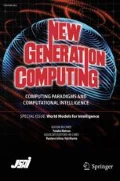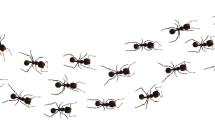Abstract
Based on the 50 papers surveyed in Reference,2) this paper addresses general research trends in agent-based macroeconomics. On the aspect ofagent engineering, we highlight two major developments: first, the extensive applications of computational intelligence tools in modeling adaptive behavior, and second the grounding of these applications in the cognitive sciences.
Similar content being viewed by others
References
Andrews, M. and Prager, R., “Genetic Programming for the Acquisition of Double Auction Market Strategies,” inAdvances in Genetic Programming (Kinnear, K. E., ed.), Vol. 1, MIT Press, pp. 355–368, 1994.
Chen, S.-H., “Agent-Based Computational Economics: A Survey,” inThe 2nd International Workshop on Agent-based Approaches in Economic and Social Complex Systems (AESCS'02) (Terano, T., Deguchi, H. and Takadama, K. Eds.), Springer-Verlag Tokyo, pp. 141–170, 2003.
Chen, S.-H. and Liao, C.-C., “Agent-Based Computational Modeling of the Stock Price-Volume Relation,” to appear inInformation Sciences.
Chen, S.-H. and Chie, B.-T., “Agent-Based Economic Modeling of the Evolution of Technology: The Relevance of Functional Modularity and Genetic Programming,” to appear inInternational Journal of Modern Physics B.
Dawid, H., “On the Convergence of Genetic Learning in a Double Auction Market,”Journal of Economic Dynamics and Control 23, pp. 1545–1567, 1999.
Izumi, K. and Ueda, K., “Using an Artificial Market Approach to Analyze Exchange Rate Scenarios,” inEvolutionary Computation in Economics and Finance (Chen, S.-H., Ed.), Physica-Verlag, 2002.
Lensberg, T., “Investment Behavior under Knightian Uncertainty- An Evolutionary Approach,”Journal of Economic Dynamics & Control 23, pp. 1587–1604, 1999.
Author information
Authors and Affiliations
Corresponding author
Additional information
Shu-Heng Chen, Ph.D.: He is a professor in the Department of Economics of the National Chengchi University. He now serves as the director of the AI-ECON Research Center, National Chengchi University, the editor-in-chief of the forthcoming journal “Fuzzy Mathematics and Natural Computing” (World Scientific) and a member of the Editorial Board of The Journal of Management and Economics. Dr. Chen holds a M.A. degree in mathematics and a Ph.D. in Economics from the University of California at Los Angeles. His research interests are mainly on the applications of computational intelligence to the agent-based computational economics and finance.
About this article
Cite this article
Chen, SH. Trends in agent-based computational modeling of macroeconomics. New Gener Comput 23, 3–11 (2005). https://doi.org/10.1007/BF03037645
Received:
Issue Date:
DOI: https://doi.org/10.1007/BF03037645




